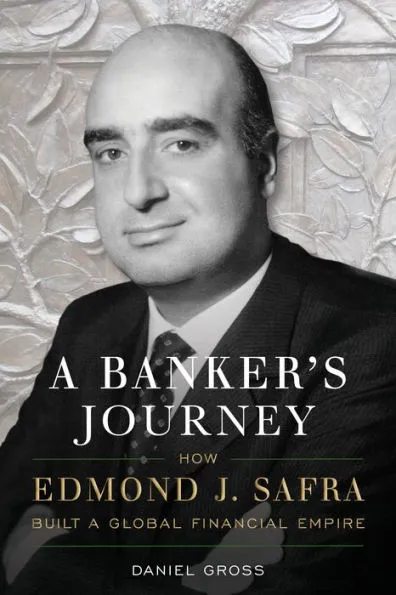Daniel Gross
A BANKER’S JOURNEY: HOW EDMOND J. SAFRA BUILT A GLOBAL FINANCIAL EMPIRE
New York: Radius Book Group, 2022. ISBN-13: 978-1635767858
Reviewed by Michael Rom1
This past summer, I attended the Edmond J. Safra Synagogue in Rio de Janeiro. Located in the beachside neighborhood of Ipanema, it is home to a community of predominantly Lebanese Jews. In their liturgy, food, and use of the Arabic language, they have preserved the rhythms, flavors, and cadences of Wadi Abu Jamil, the formerly Jewish neighborhood of Beirut.
Edmond Jacob Safra, from whom the synagogue takes its name, was a son of Wadi Abu Jamil. He was also perhaps the most successful banker of his generation, building a family dynasty to rival that of the Rothschilds and Warburgs in Europe and the Kadoories and Sassoons of the Far East. To date, two books have been written about Safra: one an account of his conflict with American Express, the other a biography of his wife.2 But neither of these books offered a proper biography of the man.
Fortunately, Daniel Gross’s A Banker’s Journey: How Edmond J. Safra Built a Global Financial Empire has remedied this situation. Extensively researched, and engagingly written, Gross traces the Safra family to Aleppo, an important node in global trade routes linking Europe and Asia, and then on to Lebanon, where Edmond Safra was born in 1932, the fourth of nine children of a family of bankers. In 1947, at the age of only fifteen, Safra began his business career in Milan, the first of a series of cities to which he would relocate, which subsequently included São Paulo, Geneva, Paris, London, and New York. Along the way, Gross charts Safra’s seemingly unstoppable momentum, and the successful banks that he founded on three continents.
While the reader learns much about Safra’s steadily upward business trajectory, there is much less about his personal life. Surprisingly for someone of Syrian-Lebanese Jewish origins, who frequently marry young and within their own community, Safra only married at age forty-three, to Lily Watkins, a Brazilian divorcée from an Ashkenazi background. Although Gross implies that Safra did not lack for female company until then, few paramours merit mention, other than in passing, such as a French girlfriend of three years and a Lebanese Jewish woman whom he briefly courted. Gross also quickly glosses over the separation between Edmond’s older brother, Elie, and the rest of the family. In choosing to overlook much of Safra’s personal life, the result is something of a hagiography, at the expense of a fuller portrait of Gross’s subject.
Even though we learn little about Safra’s early romantic pursuits, another of his great loves becomes readily apparent: his love for Lebanon. Edmond returned to the country repeatedly throughout the 1950s and 1960s, and he refused to sell his father’s Lebanese bank, which he had inherited, even during the ravages of the Lebanese civil war. Rather, he took great pains to obtain visas for the bank’s executives to travel to Switzerland to meet with him. He also imported large amounts of pistachios and za’atar in order to recreate the tastes of his homeland. Most touchingly, Safra refused to renounce his Lebanese citizenship when he became a citizen of Monaco, obtaining a special exception that allowed him to retain it.
All in all, Gross’s biography is an important contribution to the study of the Lebanese Jewish diaspora, one that is sure to find many readers among its descendants throughout the Americas, Europe, and Israel, and among others interested in economic and financial history.
1 Michael Rom is a Harry Starr Fellow in Judaica at Harvard University and an SSHRC Postdoctoral Research Fellow at the University of British Columbia. His current research examines the immigration of Egyptian Jews to Brazil during the late 1950s.
2 Bryan Burrough, Vendetta: American Express and the Smearing of Edmond Safra (New York: HarperCollins, 1992) and Isabel Vincent, Gilded Lily: Lily Safra, the Making of One of the World's Wealthiest Widows (New York: Harper, 2010).
Copyright by Sephardic Horizons, all rights reserved. ISSN Number 2158-1800

